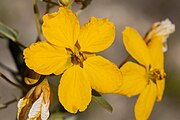Senna roemeriana, the twoleaf senna, is a species of flowering plant in the family Fabaceae, native to the US states of New Mexico and Texas, and to northern Mexico.[1][2] A perennial of limestone soils and typically 18 in (46 cm) tall, it is toxic to livestock, particularly goats and sheep, but they avoid consuming it with proper range management.[3]
| Senna roemeriana | |
|---|---|

| |
| Habit | |

| |
| Leaves | |
| Scientific classification | |
| Kingdom: | Plantae |
| Clade: | Tracheophytes |
| Clade: | Angiosperms |
| Clade: | Eudicots |
| Clade: | Rosids |
| Order: | Fabales |
| Family: | Fabaceae |
| Subfamily: | Caesalpinioideae |
| Genus: | Senna |
| Species: | S. roemeriana
|
| Binomial name | |
| Senna roemeriana | |
| Synonyms[1] | |
| |
References
edit- ^ a b "Senna roemeriana (Scheele) H.S.Irwin & Barneby". Plants of the World Online. Royal Botanic Gardens, Kew. Retrieved 3 May 2023.
- ^ "Senna roemeriana (Scheele) Irwin & Barneby Twoleaf Senna, Two Leaved Senna". Plant Database. Lady Bird Johnson Wildflower Center. 19 February 2015. Retrieved 3 May 2023.
- ^ Landers, Jake (April 2009). "Double Trouble-Twin Leaf Sennas". Ranch and Rural Living. 90 (7). San Angelo, Texas: 5–35. Retrieved 3 May 2023.
Two-leaf or Twin-leaf Senna
